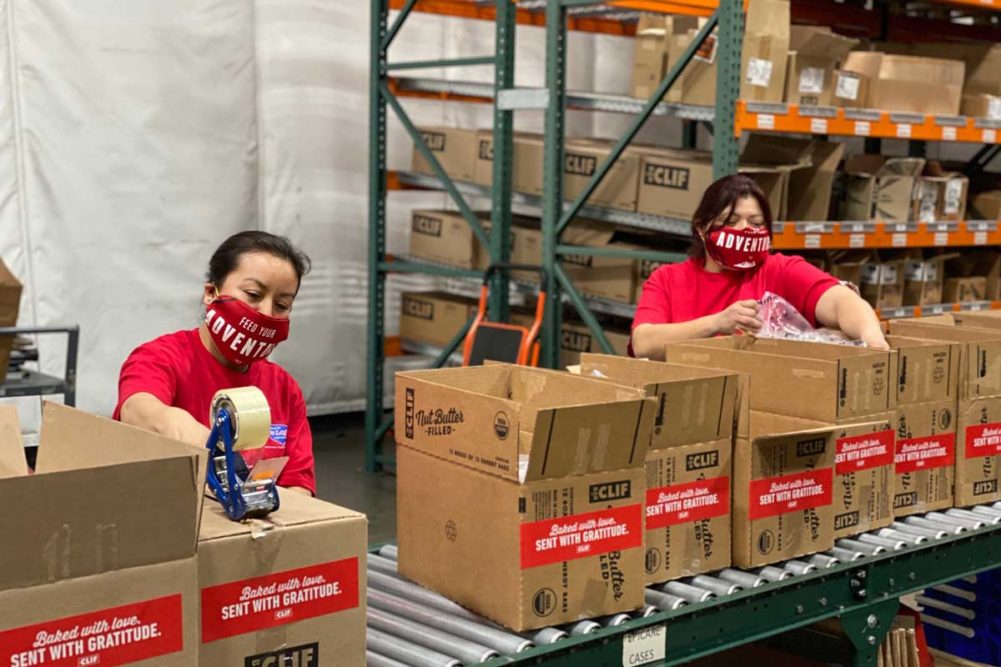When the coronavirus (COVID-19) reached the United States, many companies that promote social responsibility quickly extended their efforts into supporting employees and communities through the many challenges the pandemic brought.
For employee support, that meant incentivizing them to come to work by providing a safe environment and monetary rewards. Toufayan Bakeries, Ridgefield, NJ, gave its employees, both production and office staff, a 10% raise for six to seven weeks.
“That helped in a lot of ways, like people being able to hire a babysitter if they had lost their childcare,” said Karen Toufayan, vice president of sales and marketing. “It helped in ways we didn’t even understand. Some of our employees took that money and made their own donations to food banks, which really moved us.”
The Toufayan family took this a step further by estimating the total amount of that 10% bump and donated the same — a little more than $200,000 — to local food banks in New Jersey and Central Florida where the company’s three bakeries are located.
The Kellogg Company, Battle Creek, Mich., allowed front-line workers extended sick time and provided thank-you bonuses and schedule flexibility to enable them to care for their children. The company also expanded its workforce in places where there was increased demand.
[Related reading: General Mills CEO talks racial unrest, navigating a global pandemic]
“That ensured our hard-working employees also have time to rest and recharge away from work,” said Kris Bahner, senior vice president, global corporate affairs, Kellogg Company.
For Wyandot, Marion, Ohio, supporting employees looked like an extra days’ worth of pay a week for seven weeks if they came to work. Typically, employees usually are allowed to take home two bags of snacks per week; the company increased it to a case for workers to distribute or keep as they saw fit. And Wyandot bought more than $10,000 worth of gift cards from Marion businesses, particularly restaurants, to not only support the local economy but also reward employees.
“The gift cards were a way to say, ‘We’re committed to Marion. We’re committed to helping out the businesses that employ your family and friends,’ ” said Rob Sarlls, president and chief executive officer of Wyandot. “We want to help keep Marion strong. That visceral commitment to Marion gave our employees a lot of pride.”
Wyandot also donated personal protective equipment and 60,000 lbs of snacks to first responders, the local school system and food banks. The company frontloaded some of its annual giving to the beginning of the year, making sizeable contributions to the Mid Ohio food bank and a relief fund for restaurant workers.
“We felt so fortunate that we were able to continue baking bread, to continue manufacturing, that we had to find a way to give back."
Karen Toufayan, Toufayan Bakeries
When giving back to the community, it is an obvious choice for food manufacturers to focus on the thing they do best: feed people. This became the core of many companies’ COVID-19 response.
“As the pandemic began impacting North America, we recognized the immediate need for shelf-stable food and funding to help organizations meet the rapidly changing needs of their communities,” said Kim Fortunato, vice president, community affairs, Campbell Soup Co., Camden, NJ.
Campbell made an initial commitment of $1 million of financial and product donations in mid-March to food banks and local pantries in its 33 hometown communities. Since that initial donation, Campbell has grown that amount to more than $5 million in the United States.
Clif Bar, Emeryville, Calif., donated 14 million CLIF, LUNA and CLIF Kid Bars to food banks, first responders, non-profit partners and frontline healthcare workers. It also made up to 450 meals a week at its headquarters to feed volunteers at the Oakland Unified School District.
The Kellogg Company has taken its COVID-19 relief global through its Kellogg’s Better Days global purpose platform and donated more than $11.5 million in food and funds to hunger relief efforts related to COVID-19 around the world. The donations are supporting The Global FoodBanking Network, European Food Banks Federation, Feeding America and Food Banks Canada.
[Related reading: Food companies team up to help frontline workers]
In addition to its support of national and local nonprofit organizations in its hometown of Baltimore, H&S Bakery donated 20,000 loaves of bread weekly to more than 40 charities.
“Despite the bakery’s extensive divisions and holdings, neither our company nor its family members have strayed far from our Baltimore roots and take pride in giving back to the city that helped build out business,” said Bill Paterakis, CEO of H&S Bakery. “Further, H&S has made contributions in all locales in which we operate a bakery.”
While the pandemic may have afforded many opportunities to give, for many of these companies it was just an extension of the commitment they had already made to corporate social responsibility. And for these businesses there was no other choice.
“We felt so fortunate that we were able to continue baking bread, to continue manufacturing, that we had to find a way to give back,” Ms. Toufayan said.
This article is an excerpt from the July 2020 issue of Baking & Snack. To read the entire feature on social responsibility, click here.






